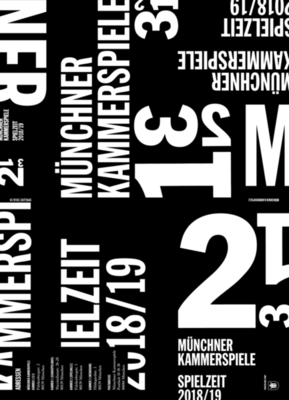Munich Kammerspiele – Season 2018/19
Justice is “out” and immortality is “in”.
Artistic Director Matthias Lilienthal presented the new season together with directors Christopher Rüping, Susanne Kennedy, and Trajal Harrell in June. Whilst the press were enjoying Lebanese pizza and wine, Lilienthal announced thirteen new productions for 2018/19 of which seven would be world premieres.

The new season will begin with three premieres on three consecutive days. The opening production on 4th October will be Uncanny Valley by Stefan Kaegi of Rimini Protokoll. Focusing on the chances and dangers of Artificial Intelligence and Deep Learning, Kaegi’s production will feature a copy of writer Thomas Melle in the form of a humanoid robot on stage. Kaegi explores in his work what subjectivity means to us in the “post-human” era. What does it mean for the theatre? What does it mean for the original when the copy takes over? Do they become more or less visible? Do they work together or are they antagonistic?
After his intriguing work Juliet and Romeo, New York choreographer Trajal Harrell returns to the Kammerspiele on 5th October with his production Morning in Byzantium, based on Harrell’s favourite film as a child. A gardener, plagued by sadness, receives pleasure from tending his flowers, yet he fears the destruction of the world and the possible results of just one wrong decision. Harrell draws parallels to the story of Orpheus, who did not dare to look forward and had his happiness destroyed by his pessimism.
A definite highlight of the 2018/19 season should be Christopher Rüping‘s bold 10-hour epos Dionysos Stadt (Dionysos City). Featuring many characters of ancient Greek drama such as Prometheus, Philoctetes, Antigone and Cassandra, Elektra and Oedipus, Rüping’s production will try to recreate the Dionysia for a modern audience by using a contemporary approach to the ancient form. A cast of eight actors will provide a Dionysian day for their audience, starting from 6th October.
Inspired by the #MeToo debate, Israeli director Yael Ronen will explore in #Genesis, what ways Biblical images have shaped us and what we see in them today. Iranian Amir Reza Koohestani will direct his first western play and investigate in Macbeth how political power relations can be strengthened or questioned by telling fictional stories at a time when governments of many countries try to influence artists and institutions. Rabih Mroué will discuss in Kommt runter vom Balkon, sonst holt euch der Vietcong (Come down from the balcony or the Vietcong will come and get you) whether theatre is an appropriate forum for collecting funds for political action. How far can political theatre go if it adheres to the rules? Leonie Böhm will test the universality of Faust in Yung Faust and Ersan Mondtag will present an adaptation of Lion Feuchtwanger’s novel Der Erfolg.Philippe Quesne will invoke the imagery of living in the countryside in his production Farm Fatale, playing with our ideas of a simple life in harmony with nature.
Susanne Kennedy, who impressed with her production The Virgin Suicides in the previous season, will tackle Chekhov‘s Three Sisters. Focusing on the image of three women who are trapped inside themselves, Kennedy will explore whether we already live in a virtual reality with our lives being determined by a machine by drawing some of her inspiration from the series Westworld and the performance history of the play. Can the three sisters liberate themselves?
Stefan Pucher will return for an adaptation of Virginie Despentes‘s social novel Vernon Subutex, for which he was fortunate enough to secure the rights. Vinyl salesman Vernon Subutex loses his job, representing middle class fears of losing their social status. Christopher Rüping will present another adaptation: Hochdeutschland, Alexander Schimmelbusch‘s response to Michel Houellebecq‘s Submission. Investment banker Victor gets bored of being super rich and therefore becomes anti-capitalist and wants to build a social state. Felix Rothenhäusler‘s fourth production at the Kammerspiele will be based on a film, on Lars von Trier‘s apocalyptic Melancholia. A woman can only feel pleasure in the knowledge that everything that exists will be destroyed.
Ranging from the Dionysia to Artificial Intelligence, Matthias Lilienthal’s new season promises to be both bold and challenging, as it should be.
By Carolin Kopplin
Further info and book tickets here…


Leave a Comment